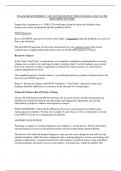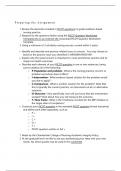Themaverick
On this page, you find all documents, package deals, and flashcards offered by seller themaverick.
- 23
- 0
- 0
Community
- Followers
- Following
23 items
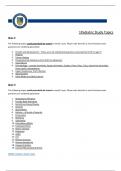
nr602-pediatric-topic-list
nr602-pediatric-topic-list
- Lecture notes
- • 3 pages •
nr602-pediatric-topic-list
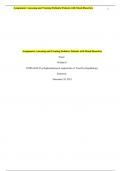
Assessing Anxiety Disorders
History of Present Illness This boy was previously diagnosed with attention-deficit/hyperactivity disorder (ADHD). The school reports that he cannot stay seated, frequently calls out in class, is disorganized, cannot complete his assignments, and has been known to be disrespectful to adults. According to his mother, he is very impatient and impulsive. At age 3, the child was in the Head Start Program, and it was noted that he was demonstrating extreme hyperactivity, poor impulse control, and d...
- Lecture notes
- • 2 pages •
History of Present Illness This boy was previously diagnosed with attention-deficit/hyperactivity disorder (ADHD). The school reports that he cannot stay seated, frequently calls out in class, is disorganized, cannot complete his assignments, and has been known to be disrespectful to adults. According to his mother, he is very impatient and impulsive. At age 3, the child was in the Head Start Program, and it was noted that he was demonstrating extreme hyperactivity, poor impulse control, and d...
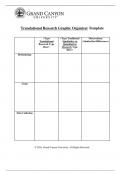
NUR 225
History of Present Illness This boy was previously diagnosed with attention-deficit/hyperactivity disorder (ADHD). The school reports that he cannot stay seated, frequently calls out in class, is disorganized, cannot complete his assignments, and has been known to be disrespectful to adults. According to his mother, he is very impatient and impulsive. At age 3, the child was in the Head Start Program, and it was noted that he was demonstrating extreme hyperactivity, poor impulse control, and d...
- Summary
- • 1 pages •
History of Present Illness This boy was previously diagnosed with attention-deficit/hyperactivity disorder (ADHD). The school reports that he cannot stay seated, frequently calls out in class, is disorganized, cannot complete his assignments, and has been known to be disrespectful to adults. According to his mother, he is very impatient and impulsive. At age 3, the child was in the Head Start Program, and it was noted that he was demonstrating extreme hyperactivity, poor impulse control, and d...
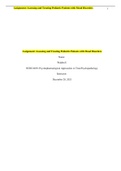
To cope with an anxiety disorder, here's what you can do: 1. Learn about your disorder.Talk to your doctor or mental health provider. Find out what might be causing your specific condition and what treatments might be best for you. Involve your family
To cope with an anxiety disorder, here's what you can do: 1. Learn about your disorder.Talk to your doctor or mental health provider. Find out what might be causing your specific condition and what treatments might be best for you. Involve your family and friends and ask for their support
- Essay
- • 2 pages •
To cope with an anxiety disorder, here's what you can do: 1. Learn about your disorder.Talk to your doctor or mental health provider. Find out what might be causing your specific condition and what treatments might be best for you. Involve your family and friends and ask for their support
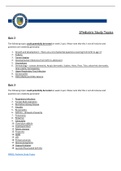
To cope with an anxiety disorder, here's what you can do: 1. Learn about your disorder.Talk to your doctor or mental health provider. Find out what might be causing your specific condition and what treatments might be best for you. Involve your family
To cope with an anxiety disorder, here's what you can do: 1. Learn about your disorder.Talk to your doctor or mental health provider. Find out what might be causing your specific condition and what treatments might be best for you. Involve your family and friends and ask for their support
- Essay
- • 3 pages •
To cope with an anxiety disorder, here's what you can do: 1. Learn about your disorder.Talk to your doctor or mental health provider. Find out what might be causing your specific condition and what treatments might be best for you. Involve your family and friends and ask for their support
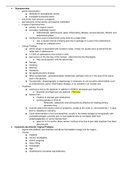
To cope with an anxiety disorder, here's what you can do: 1. Learn about your disorder.Talk to your doctor or mental health provider. Find out what might be causing your specific condition and what treatments might be best for you. Involve your family
To cope with an anxiety disorder, here's what you can do: 1. Learn about your disorder.Talk to your doctor or mental health provider. Find out what might be causing your specific condition and what treatments might be best for you. Involve your family and friends and ask for their support
- Essay
- • 20 pages •
To cope with an anxiety disorder, here's what you can do: 1. Learn about your disorder.Talk to your doctor or mental health provider. Find out what might be causing your specific condition and what treatments might be best for you. Involve your family and friends and ask for their support
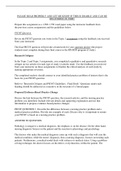
To cope with an anxiety disorder, here's what you can do: 1. Learn about your disorder.Talk to your doctor or mental health provider. Find out what might be causing your specific condition and what treatments might be best for you. Involve your family
To cope with an anxiety disorder, here's what you can do: 1. Learn about your disorder.Talk to your doctor or mental health provider. Find out what might be causing your specific condition and what treatments might be best for you. Involve your family and friends and ask for their support
- Essay
- • 2 pages •
To cope with an anxiety disorder, here's what you can do: 1. Learn about your disorder.Talk to your doctor or mental health provider. Find out what might be causing your specific condition and what treatments might be best for you. Involve your family and friends and ask for their support
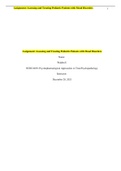
To cope with an anxiety disorder, here's what you can do: 1. Learn about your disorder.Talk to your doctor or mental health provider. Find out what might be causing your specific condition and what treatments might be best for you. Involve your family
To cope with an anxiety disorder, here's what you can do: 1. Learn about your disorder.Talk to your doctor or mental health provider. Find out what might be causing your specific condition and what treatments might be best for you. Involve your family and friends and ask for their support
- Essay
- • 2 pages •
To cope with an anxiety disorder, here's what you can do: 1. Learn about your disorder.Talk to your doctor or mental health provider. Find out what might be causing your specific condition and what treatments might be best for you. Involve your family and friends and ask for their support

